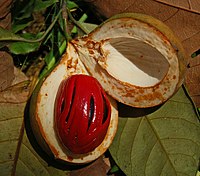
Photo from wikipedia
KEY MESSAGE Overexpression of genes involved in coumarin production and secretion can mitigate mycorrhizal incompatibility in nonhost Arabidopsis plants. The coumarin scopoletin, in particular, stimulates pre-penetration development and metabolism in… Click to show full abstract
KEY MESSAGE Overexpression of genes involved in coumarin production and secretion can mitigate mycorrhizal incompatibility in nonhost Arabidopsis plants. The coumarin scopoletin, in particular, stimulates pre-penetration development and metabolism in mycorrhizal fungi. Although most plants can benefit from mutualistic associations with arbuscular mycorrhizal (AM) fungi, nonhost plant species such as the model Arabidopsis thaliana have acquired incompatibility. The transcriptional response of Arabidopsis to colonization by host-supported AM fungi switches from initial AM recognition to defense activation and plant growth antagonism. However, detailed functional information on incompatibility in nonhost-AM fungus interactions is largely missing. We studied interactions between host-sustained AM fungal networks of Rhizophagus irregularis and 18 Arabidopsis genotypes affected in nonhost penetration resistance, coumarin production and secretion, and defense (salicylic acid, jasmonic acid, and ethylene) and growth hormones (auxin, brassinosteroid, cytokinin, and gibberellin). We demonstrated that root-secreted coumarins can mitigate incompatibility by stimulating fungal metabolism and promoting initial steps of AM colonization. Moreover, we provide evidence that major molecular defenses in Arabidopsis do not operate as primary mechanisms of AM incompatibility nor of growth antagonism. Our study reveals that, although incompatible, nonhost plants can harbor hidden tools that promote initial steps of AM colonization. Moreover, it uncovered the coumarin scopoletin as a novel signal in the pre-penetration dialogue, with possible implications for the chemical communication in plant-mycorrhizal fungi associations.
Journal Title: Plant molecular biology
Year Published: 2021
Link to full text (if available)
Share on Social Media: Sign Up to like & get
recommendations!